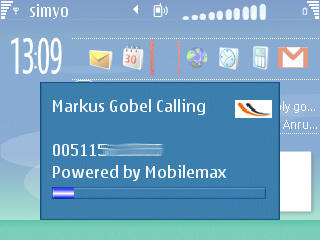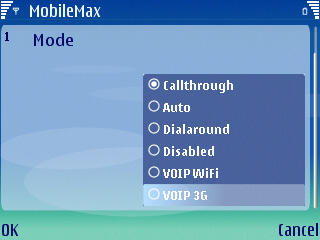When
Packet8 presented last week their service
MobileTalk I was fascinated, but just for some seconds. Then I thought: What a lost opportunity! It could have been such a great application, if it 1.) hadn't such an expensive basic fee, 2.) wasn't bound to one particular VoIP provider and 3.) didn't work
only in the US.
The
press release explains very well how it works:
Packet8 MobileTalk utilizes a downloadable software application that can currently reside on any Windows, Palm or Symbian based mobile phone to seamlessly connect international calls from the mobile phone to the Packet8 digital VoIP network. Routing these calls over the Packet8 network enables cell phone users to significantly reduce their international phone bills and maintain high international voice quality while still enjoying the convenience and flexibility of mobile calling. [...]
With Packet8 MobileTalk, subscribers won't think twice about calling Europe or Asia because instead of $1.00 to $3.00 per minute, they will be paying as little as $.02 to $.05 per minute over the Packet8 network to most destinations. With more than 340 mobile phones from any cell phone carrier currently supported, the Packet8 MobileTalk service is a vital tool for mobile business professionals and consumers. [...]
Unlike calling card, callback and other reduced-rate international mobile calling services, which require the user to dial numerous key strokes in addition to their destination number or make their calls through cumbersome software applications, Packet8 MobileTalk users can dial calls directly and natively from their mobile handset, contact list or speed dial directory with no additional keystrokes - a significant advantage when, for example, placing a call while driving. Once the destination number is dialed or selected, the Packet8 MobileTalk software application identifies the international prefix being called and redirects the call to a local Packet8 network access number. With Packet8 MobileTalk, all calls are carried to the Packet8 network over the subscriber's existing cellular voice phone service and do not require access to an expensive monthly data plan or WiFi access point. [...]
There is a one-time $9.99 activation fee for the service and a monthly fee of $9.99 for non-Packet 8 subscribers. Existing Packet8 VoIP subscribers, including subscribers with one Packet8 MobileTalk account, pay a monthly service fee of $4.99. Packet8 MobileTalk overseas calls are billed at Packet8's low international rates which can be found at http://www.packet8.net/international_services/.
That's a quite expensive monthly rent for a small piece of software. Given that there are no calls included in the recurring fee of $9.99. On top you always have to pay the per minute price for the calls, which is e. g. $0.03 to a German landline. The several
Betamax companies charge only half the price, $0.015, for the same service. Or the call is free, included for instance in Voipstunt's flatrate price of € 10.00 for 120 days (roughly equivalent to $ 13.40).
I guess that people who acquire Packet8 MobileTalk suffer very strong from dialing "numerous key strokes in addition to their destination number or make their calls through cumbersome software applications". If not, $9.99 is a rip off. Taking into account that other
callthrough applications like
Runningmobile's cost just €19.95 (about $30). But only one time, when you buy it.
Nevertheless the functionality of Packet8 Mobile Talk is quite smart and better than other "cumbersome software applications". Perry Nalevka is Director of Business Development at the Israeli company MobileMax, which developed the software for Packet8. He explains in a
comment to Pat Phelan's regarding blog entry:
1) The application sits on in the background of the phone and allows the user to use their phone normally and dial from their address book or call log
2) Supports BlackBerry, Windows, Palm and Symbian phones currently. The Java will be ready next year.
3) Calls are “caught” and routed by pre-configured parameters. In the case of Packet8 any call that begins with “011″ or calls that begin with “+” that are not in the US.
Hopefully Nalevka doesn't break an NDA by telling that his company is behind Packet8's software. He mentions it also in Tom Keating's
blog. So MobileTalk from Packet8 works similar to the
Wifimobile application, which sits in the background of your cell phone and only kicks in when you dial an international number. Only that Wifimobile tries to establish the call over Wifi while Packet8 establishes the call over callthrough. The callthrough numbers are stored in the software, like it is at
iSkoot.
Let's wait and see now when Wifimobile comes up with the same callthrough feature. They have already recognized that Wifi isn't everywhere and offer callthrough numbers in
12 countries. Much better than MobileTalk which works only in the US. Also at Wifimobile you pay only $15.99 per month and get unlimited calls to landlines in 40 countries. This feels much cheaper than Packet8's offer. The only point is that Wifimobile's application works only on Nokia smartphones and the nifty callthrough is not yet part of the software. Users still have to dial "numerous key strokes in addition to their destination number".
Which brings me to the point: Companies like Truphone, Gizmo Project, Wifimobile and the like should make callthrough numbers a part of their mobile applications to make them usable outside of Wifi.
Or couldn't
Jajah strike an agreement with MobileMax and let them make a software which handles the
Jajah Direct numbers? Last week they
celebrated themselves for eliminating the need for computer to make Internet calls, only to present a system that's not less complicated: Now people have to dial numbers which are 24 digits long.
A similar case is
Truphone: Their software does pretty much everything. It automatically updates the call forward when you insert a foreign SIM card in your cell phone while travelling. Couldn't it also hold some callthrough numbers? If the company doesn't want to set up their own numbers they could surely make an agreement with
Sipbroker or
Tpad. These VoIP companies have callthrough numbers in nearly every country of the world. The Truphone software could automatically "sense" which country's callthrough number to use, since it already uses a similar functionality to forward calls from Truphone number to local SIM card. If that's not so easy the Truphone software should have a button to choose the country.
Or maybe Tpad and Sipbroker should design their own callthrough softwares, a proposal I directly made in their forums.
Tpad's answer from the forum admin:
I will definitely mention your idea to management, but early next year we are starting work on a Tpad Global Freephone Number (cant mention too much detail at the moment, but from what we have come up with so far it is looking pretty good).
We are aware of the German Running Mobile, but we will have to check the other sites out.
Thanks for your ideas, we respect what our forum members want and we will try our best to develope them.
A "Tpad Global Freephone Number"? Now that's even more tricky. It would address the downside of the Sipbroker which is explained in a
comment to Pat Phelan's blog entry:
What would make more sense for a large player is to negotiate preferable rates for access through 00800 (international toll free) straight to their own VOIP switch. Going through sipbroker access numbers that are operated by dozens of different VOIP carriers would not lead to consistant QoS.
OK, so QoS fans should use their own numbers, although many people use the Sipbroker numbers without problems. In the
forum of Sipbroker's mothership
Voxalot we developed some interesting ideas.
Maybe Voxalot could design my "callthrough dream application"?
It holds all Sipbroker numbers, kicks in only when make an international call and let's me use my own VoIP providers - like a already do on Voxalot's all purpose VoIP PBX. People would always only pay a local call and the international part goes over the respective VoIP provider. The mobile application should always “sense” in which country the cell phone is situated and choose the local Sipbroker number to establish the call.
I am craving for a really comprehensive application: sitting in the background like Packet8 and always kicking in when I need it, automatically making use of the callthrough number of the country where I am. Be it Jajah's, Tpad's, Sipbroker's, Net2max' or whatever callthrough number. I am a client of all these companies anyway.
It should be a "callthrough consolidator", like
Devicescape is a Wifi consolidator for mobile phones.
Devicescape let's me consolidate all the Wifi hotspots for my mobile phone into just one virtual hotspot. The callthrough software should do the same with all these numbers. I would even make myself the work to copy all callthrough numbers into my account on a website. The way that I can copy all login data of different Wifi hotspots into my account on the Devicescape website. Devicescape knows them all. No hassle with Wifi configuration on my tiny phone keyboard.
Who can build a Devicescape for callthrough?
Maybe a guy from Poland, called Marek. But until now he has only sent me ideas that go in this direction. No downloadable application.

